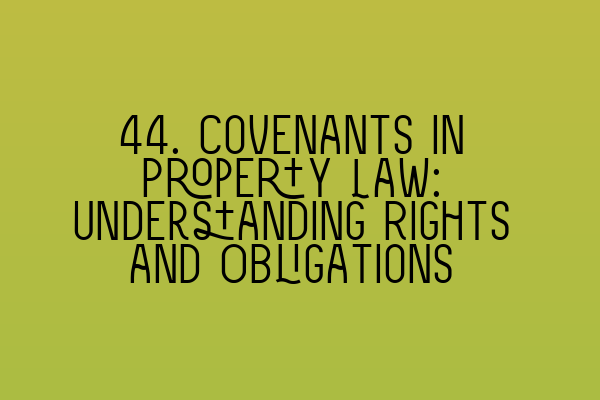44. Covenants in Property Law: Understanding Rights and Obligations
When it comes to property law, there are many complex legal concepts that one must navigate. One such concept is that of covenants. Covenants are legally binding obligations that are attached to a property. They govern the rights and responsibilities of property owners and can have a significant impact on the use and enjoyment of the land. In this blog post, we will explore the ins and outs of covenants in property law, helping you to understand the rights and obligations involved.
What is a Covenant?
A covenant is a promise or agreement that is made between parties, typically relating to the use or restriction of land. It is a legally binding obligation that is attached to a property, regardless of who owns it. Covenants can be affirmative, requiring the owner to do something, or negative, prohibiting certain actions. They are usually included in the deeds of a property and bind both the current owner and any future owners.
Types of Covenants
There are several types of covenants that can be found in property law. These include:
- Restrictive Covenants: These covenants place limitations on how the property can be used. For example, a restrictive covenant may prohibit the construction of certain types of buildings or the running of a business from the property.
- Positive Covenants: Positive covenants require the property owner to take certain actions. This can include maintaining the property or contributing to the upkeep of shared amenities.
- Profit a Prendre: This type of covenant grants a person the right to take something from the land, such as timber or minerals.
- Easements: Easements are a special type of covenant that grants someone the right to use part of the land. Common examples of easements include rights of way and drainage rights.
Enforcing Covenants
When a covenant is breached, it may be necessary to enforce it. This is typically done through legal action. The party seeking enforcement must prove that the covenant exists, is valid, and has been breached. If successful, the court may grant a range of remedies, including damages or an injunction. It is important to note that not all covenants can be enforced. Some may have expired or become unenforceable over time.
Alteration and Discharge
In some cases, it may be possible to alter or discharge a covenant. This can be done through a formal legal process, such as applying to the Lands Tribunal for a modification or release. Alteration or discharge of a covenant may be granted if certain criteria are met, such as the covenant being obsolete or impeding development.
Conclusion
Covenants play a crucial role in property law, governing the rights and obligations of property owners. Understanding the different types of covenants and how they can be enforced is essential for anyone involved in property transactions. If you have any further questions or require assistance with covenants or any other aspect of property law, do not hesitate to contact SQE Property Law & Land Law.
Related Articles:
